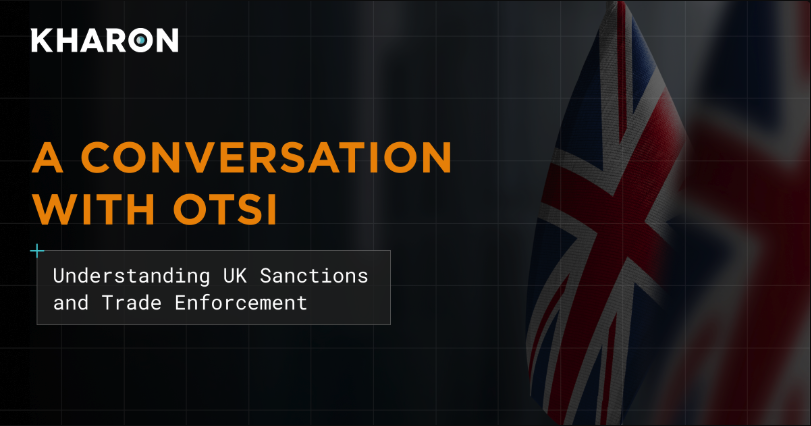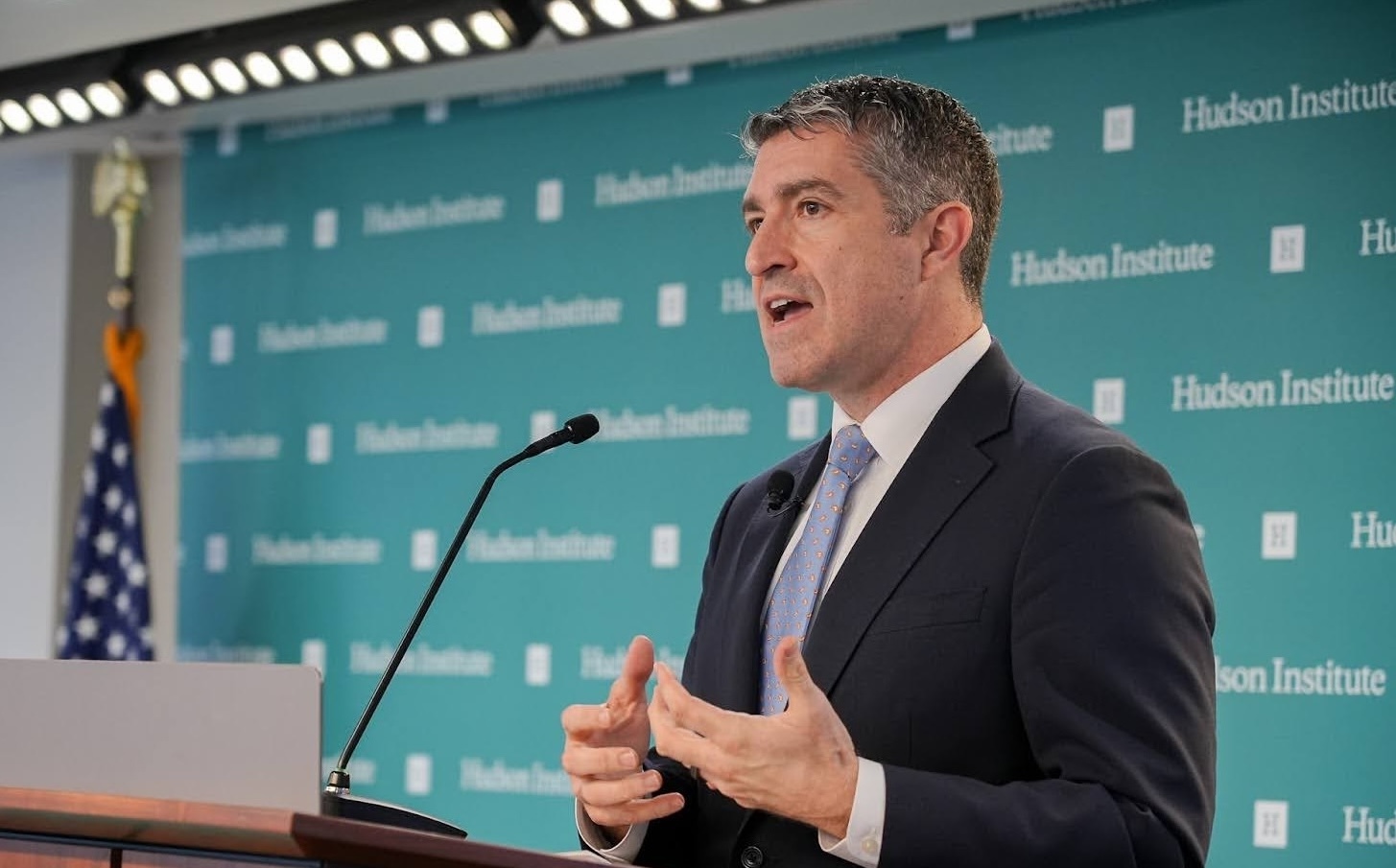The Office of Trade Sanctions Implementation (OTSI) launched in October with a timely mandate: strengthen the U.K.’s implementation and civil enforcement efforts as international sanctions against Russia continue to multiply.
Four months in, OTSI is finding its footing—and a lot to do.
“We’re really mindful of the fact that sanctions now affect businesses that never had to think about sanctions before,” OTSI’s deputy director, Anna Deibel-Jung, said during a Kharon webinar last week. “We have brought sectors into sanctions for whom it is entirely new to be thinking about sanctions compliance and [which] will operate in quite different ways from the sectors that are used to operating with sanctions.”
The webinar, hosted by Freya Page, Kharon’s director of global outreach, was titled “A Conversation with OTSI: Understanding UK Sanctions and Trade Enforcement.” But Deibel-Jung emphasized that OTSI’s work can’t be “just about enforcement. It’s actually about supporting compliance among sectors that have a low base for understanding what their obligations are and how they comply.”
And a key piece of educating businesses and the British public about trade sanctions, she said, is educating them about OTSI itself.
Backstory: The U.K. government announced plans for OTSI in December 2023, as “a new unit to crack down on companies dodging Russian sanctions.” The office then launched last fall, under the Department of Business and Trade, as a first-100-days initiative of the new British government.
The 2023 OTSI announcement touted the U.K.’s sanctions against Russia as “the most severe ever imposed on a major economy.” But “leaving no stone unturned” in undermining Russia’s war machine, it said, would mean “clamping down” on sanctions evasion.
“Our assessment was [that] we needed to do more,” Deibel-Jung said. “We needed to boost our tool kit; we needed to boost our capacity to enforce those sanctions. So that is where OTSI came from.”
How OTSI works: Prevention is the priority. The office has “done a huge amount of engagement so far” with businesses about sanctions policy, Deibel-Jung said, and it’s seeking now to connect with “hard-to-reach places” that might be less familiar with sanctions rules, including those outside the financial and legal sectors.
Shortly after OTSI formally launched, it published guidance on “Preventing Russian export control and sanctions evasion,” including red flags that should nudge exporters to add “an extra layer of due diligence,” as Deibel-Jung put it.
If an entity does have a suspected sanctions breach to report, OTSI has a tool on the U.K. government site through which to do so. A webpage includes information about possible violations, reporting obligations and more before users get there.
“We're not asking for a huge amount of detail,” Deibel-Jung said, “but the way we step through the questions gives us pretty much everything we think we need in order to make a good credible assessment of that breach report, and obviously that means that we can then respond quicker.”
Know your terms: OTSI is a close partner of the similarly abbreviated OFSI, the U.K.’s Office of Financial Sanctions Implementation. The two offices’ work also intersects with that of His Majesty’s Revenue and Customs (HMRC) and the Export Control Joint Unit (ECJU).
OTSI’s lane, Diebel-Jung explained, is services licensing and civil enforcement concerning:
“If in doubt, please come and talk to us,” Deibel-Jung said during the Kharon webinar. “There is no wrong door.”
What’s next: OTSI is still new, and its approach and role within the U.K.’s implementation and enforcement is still evolving. The office wants to hear from stakeholders to help.
“Please do come and tell us where you think we need to focus our efforts,” Deibel-Jung said. “This has to be a partnership. ‘Sanctions is a team game’ is something that I hear time and time again in the sense of outreach and engagement, and it absolutely has to be.”
That’s the ethos that OTSI has led with these first four months. And it might be part of what’s attracted international attention—already—too.
“It’s been really fascinating, actually, to see how many countries are keen to come and talk to us about what we’ve done, with a view to replicating or doing a version of what we’ve done on OTSI and stepping up the game on trade sanctions implementation enforcement internationally,” Deibel-Jung said. “It’s been brilliant to sort of be seen as a bit of a leader there and to share our learnings and best practices as we go as well.”
Four months in, OTSI is finding its footing—and a lot to do.
“We’re really mindful of the fact that sanctions now affect businesses that never had to think about sanctions before,” OTSI’s deputy director, Anna Deibel-Jung, said during a Kharon webinar last week. “We have brought sectors into sanctions for whom it is entirely new to be thinking about sanctions compliance and [which] will operate in quite different ways from the sectors that are used to operating with sanctions.”
The webinar, hosted by Freya Page, Kharon’s director of global outreach, was titled “A Conversation with OTSI: Understanding UK Sanctions and Trade Enforcement.” But Deibel-Jung emphasized that OTSI’s work can’t be “just about enforcement. It’s actually about supporting compliance among sectors that have a low base for understanding what their obligations are and how they comply.”
And a key piece of educating businesses and the British public about trade sanctions, she said, is educating them about OTSI itself.
Backstory: The U.K. government announced plans for OTSI in December 2023, as “a new unit to crack down on companies dodging Russian sanctions.” The office then launched last fall, under the Department of Business and Trade, as a first-100-days initiative of the new British government.
The 2023 OTSI announcement touted the U.K.’s sanctions against Russia as “the most severe ever imposed on a major economy.” But “leaving no stone unturned” in undermining Russia’s war machine, it said, would mean “clamping down” on sanctions evasion.
“Our assessment was [that] we needed to do more,” Deibel-Jung said. “We needed to boost our tool kit; we needed to boost our capacity to enforce those sanctions. So that is where OTSI came from.”
How OTSI works: Prevention is the priority. The office has “done a huge amount of engagement so far” with businesses about sanctions policy, Deibel-Jung said, and it’s seeking now to connect with “hard-to-reach places” that might be less familiar with sanctions rules, including those outside the financial and legal sectors.
Shortly after OTSI formally launched, it published guidance on “Preventing Russian export control and sanctions evasion,” including red flags that should nudge exporters to add “an extra layer of due diligence,” as Deibel-Jung put it.
If an entity does have a suspected sanctions breach to report, OTSI has a tool on the U.K. government site through which to do so. A webpage includes information about possible violations, reporting obligations and more before users get there.
“We're not asking for a huge amount of detail,” Deibel-Jung said, “but the way we step through the questions gives us pretty much everything we think we need in order to make a good credible assessment of that breach report, and obviously that means that we can then respond quicker.”
Know your terms: OTSI is a close partner of the similarly abbreviated OFSI, the U.K.’s Office of Financial Sanctions Implementation. The two offices’ work also intersects with that of His Majesty’s Revenue and Customs (HMRC) and the Export Control Joint Unit (ECJU).
OTSI’s lane, Diebel-Jung explained, is services licensing and civil enforcement concerning:
- Provision or procurement of sanctioned trade services.
- Movement, making available or acquisition of sanctioned goods outside the U.K.
“If in doubt, please come and talk to us,” Deibel-Jung said during the Kharon webinar. “There is no wrong door.”
What’s next: OTSI is still new, and its approach and role within the U.K.’s implementation and enforcement is still evolving. The office wants to hear from stakeholders to help.
“Please do come and tell us where you think we need to focus our efforts,” Deibel-Jung said. “This has to be a partnership. ‘Sanctions is a team game’ is something that I hear time and time again in the sense of outreach and engagement, and it absolutely has to be.”
That’s the ethos that OTSI has led with these first four months. And it might be part of what’s attracted international attention—already—too.
“It’s been really fascinating, actually, to see how many countries are keen to come and talk to us about what we’ve done, with a view to replicating or doing a version of what we’ve done on OTSI and stepping up the game on trade sanctions implementation enforcement internationally,” Deibel-Jung said. “It’s been brilliant to sort of be seen as a bit of a leader there and to share our learnings and best practices as we go as well.”

Click here to watch the webinar on-demand.







